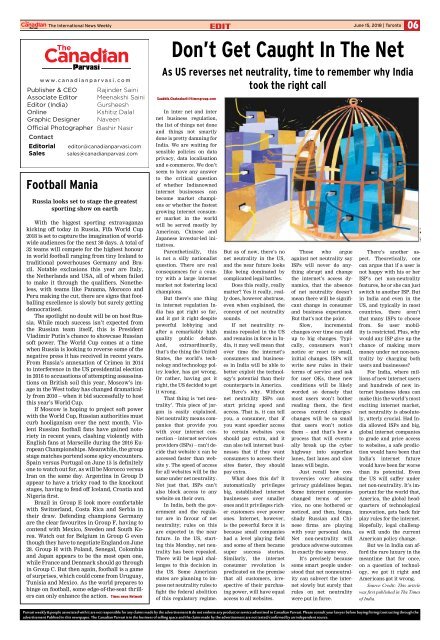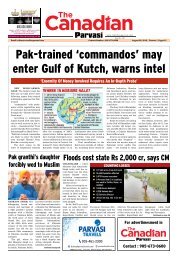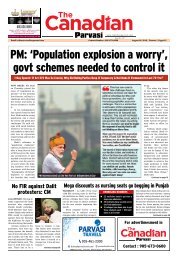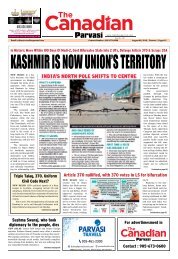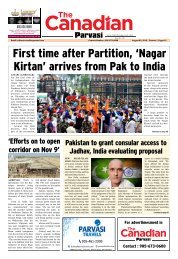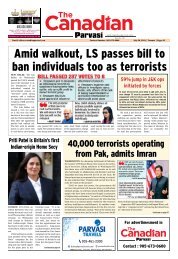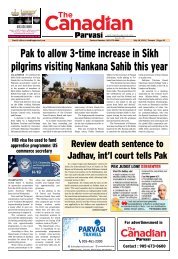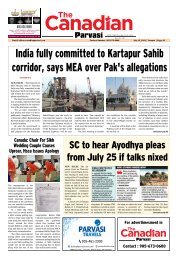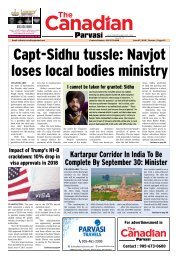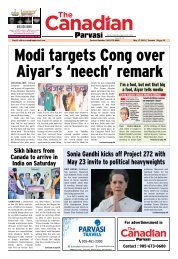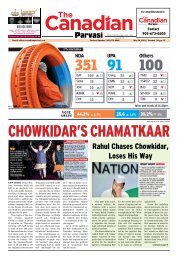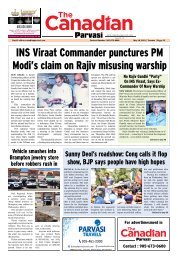The Canadian Parvasi - Issue 50
You also want an ePaper? Increase the reach of your titles
YUMPU automatically turns print PDFs into web optimized ePapers that Google loves.
EDIT<br />
<strong>The</strong> International News Weekly June 15, 2018 | Toronto 06<br />
<strong>The</strong><br />
w w w . canadianparv asi. c o m<br />
Publisher & CEO<br />
Associate Editor<br />
Editor (India)<br />
Online<br />
Graphic Designer<br />
Official Photographer<br />
Contact<br />
Editorial<br />
Sales<br />
Football Mania<br />
Rajinder Saini<br />
Meenakshi Saini<br />
Gursheesh<br />
Kshitiz Dalal<br />
Naveen<br />
Bashir Nasir<br />
editor@canadianparvasi.com<br />
sales@canadianparvasi.com<br />
Russia looks set to stage the greatest<br />
sporting show on earth<br />
With the biggest sporting extravaganza<br />
kicking off today in Russia, Fifa World Cup<br />
2018 is set to capture the imagination of worldwide<br />
audiences for the next 30 days. A total of<br />
32 teams will compete for the highest honour<br />
in world football ranging from tiny Iceland to<br />
traditional powerhouses Germany and Brazil.<br />
Notable exclusions this year are Italy,<br />
the Netherlands and USA, all of whom failed<br />
to make it through the qualifiers. Nonetheless,<br />
with teams like Panama, Morocco and<br />
Peru making the cut, there are signs that footballing<br />
excellence is slowly but surely getting<br />
democratised.<br />
<strong>The</strong> spotlight no doubt will be on host Russia.<br />
While much success isn’t expected from<br />
the Russian team itself, this is President<br />
Vladimir Putin’s chance to showcase Russian<br />
soft power. <strong>The</strong> World Cup comes at a time<br />
when Russia is looking to reverse some of the<br />
negative press it has received in recent years.<br />
From Russia’s annexation of Crimea in 2014<br />
to interference in the US presidential election<br />
in 2016 to accusations of attempting assassinations<br />
on British soil this year, Moscow’s image<br />
in the West today has changed dramatically<br />
from 2010 – when it bid successfully to host<br />
this year’s World Cup.<br />
If Moscow is hoping to project soft power<br />
with the World Cup, Russian authorities must<br />
curb hooliganism over the next month. Violent<br />
Russian football fans have gained notoriety<br />
in recent years, clashing violently with<br />
English fans at Marseille during the 2016 European<br />
Championships. Meanwhile, the group<br />
stage matches portend some spicy encounters.<br />
Spain versus Portugal on June 15 is definitely<br />
one to watch out for, as will be Morocco versus<br />
Iran on the same day. Argentina in Group D<br />
appear to have a tricky road to the knockout<br />
stages, having to fend off Iceland, Croatia and<br />
Nigeria first.<br />
Brazil in Group E look more comfortable<br />
with Switzerland, Costa Rica and Serbia in<br />
their draw. Defending champions Germany<br />
are the clear favourites in Group F, having to<br />
contend with Mexico, Sweden and South Korea.<br />
Watch out for Belgium in Group G even<br />
though they have to negotiate England on June<br />
28. Group H with Poland, Senegal, Colombia<br />
and Japan appears to be the most open one,<br />
while France and Denmark should go through<br />
in Group C. But then again, football is a game<br />
of surprises, which could come from Uruguay,<br />
Tunisia and Mexico. As the world prepares to<br />
binge on football, some edge-of-the-seat thrillers<br />
can only enhance the action. Times news Network<br />
Don’t Get Caught In <strong>The</strong> Net<br />
As US reverses net neutrality, time to remember why India<br />
took the right call<br />
Saubhik.Chakrabarti@timesgroup.com<br />
In inter net and inter<br />
net business regulation,<br />
the list of things not done<br />
and things not smartly<br />
done is pretty damning for<br />
India. We are waiting for<br />
sensible policies on data<br />
privacy, data localisation<br />
and e-commerce. We don’t<br />
seem to have any answer<br />
to the critical question<br />
of whether Indianowned<br />
internet businesses can<br />
become market champions<br />
or whether the fastest<br />
growing internet consumer<br />
market in the world<br />
will be served mostly by<br />
American, Chinese and<br />
Japanese investor-led initiatives.<br />
Parenthetically, this<br />
is not a silly nationalist<br />
question. <strong>The</strong>re are real<br />
consequences for a country<br />
with a large internet<br />
market not fostering local<br />
champions.<br />
But there’s one thing<br />
in internet regulation India<br />
has got right so far,<br />
and it got it right despite<br />
powerful lobbying and<br />
after a remarkably high<br />
quality public debate.<br />
And, extraordinarily,<br />
that’s the thing the United<br />
States, the world’s technology<br />
and technology policy<br />
leader, has got wrong.<br />
Or rather, having got it<br />
right, the US decided to get<br />
it wrong.<br />
That thing is ‘net neutrality’.<br />
This piece of jargon<br />
is easily explained.<br />
Net neutrality means companies<br />
that provide you<br />
with your internet connection<br />
– internet services<br />
providers (ISPs) – can’t decide<br />
that website x can be<br />
accessed faster than website<br />
y. <strong>The</strong> speed of access<br />
for all websites will be the<br />
same under net neutrality.<br />
Not just that, ISPs can’t<br />
also block access to any<br />
website on their own.<br />
In India, both the government<br />
and the regulator<br />
are in favour of net<br />
neutrality; rules on this<br />
are expected in the near<br />
future. In the US, starting<br />
this Monday, net neutrality<br />
has been repealed.<br />
<strong>The</strong>re will be legal challenges<br />
to this decision in<br />
the US. Some American<br />
states are planning to impose<br />
net neutrality rules to<br />
fight the federal abolition<br />
of this regulatory regime.<br />
But as of now, there’s no<br />
net neutrality in the US,<br />
and the near future looks<br />
like being dominated by<br />
complicated legal battles.<br />
Does this really, really<br />
matter? Yes it really, really<br />
does, however abstruse,<br />
even when explained, the<br />
concept of net neutrality<br />
sounds.<br />
If net neutrality remains<br />
repealed in the US<br />
and remains in force in India,<br />
it may well mean that<br />
over time the internet’s<br />
consumers and businesses<br />
in India will be able to<br />
better exploit the technology’s<br />
potential than their<br />
counterparts in America.<br />
Here’s why. Without<br />
net neutrality ISPs can<br />
start pricing speed and<br />
access. That is, it can tell<br />
you, a consumer, that if<br />
you want speedier access<br />
to certain websites you<br />
should pay extra, and it<br />
can also tell internet businesses<br />
that if they want<br />
consumers to access their<br />
sites faster, they should<br />
pay extra.<br />
What does this do? It<br />
automatically privileges<br />
big, established internet<br />
businesses over smaller<br />
ones and it privileges richer<br />
customers over poorer<br />
ones. Internet, however,<br />
is the powerful force it is<br />
because small companies<br />
had a level playing field<br />
and some of them became<br />
super success stories.<br />
Similarly, the internet<br />
consumer revolution is<br />
predicated on the premise<br />
that all customers, irrespective<br />
of their purchasing<br />
power, will have equal<br />
access to all websites.<br />
Those who argue<br />
against net neutrality say<br />
ISPs will never do anything<br />
abrupt and change<br />
the internet’s access dynamics,<br />
that the absence<br />
of net neutrality doesn’t<br />
mean there will be significant<br />
change in consumer<br />
and business experience.<br />
But that’s not the point.<br />
Slow, incremental<br />
changes over time can add<br />
up to big changes. Typically,<br />
consumers won’t<br />
notice or react to small,<br />
initial changes. ISPs will<br />
write new rules in their<br />
terms of service and ask<br />
for user OKs, these new<br />
conditions will be likely<br />
worded so densely that<br />
most users won’t bother<br />
reading them, the first<br />
access control charges/<br />
changes will be so small<br />
that users won’t notice<br />
them – and that’s how a<br />
process that will eventually<br />
break up the cyber<br />
highway into superfast<br />
lanes, fast lanes and slow<br />
lanes will begin.<br />
Just recall how controversies<br />
over abusing<br />
privacy guidelines began.<br />
Some internet companies<br />
changed terms of service,<br />
no one bothered or<br />
noticed, and then, bingo,<br />
shady Russian and Chinese<br />
firms are playing<br />
with your personal data.<br />
Net non-neutrality will<br />
produce adverse outcomes<br />
in exactly the same way.<br />
It’s precisely because<br />
some smart people understood<br />
that net nonneutrality<br />
can subvert the internet<br />
slowly but surely that<br />
rules on net neutrality<br />
were put in force.<br />
<strong>The</strong>re’s another aspect.<br />
<strong>The</strong>oretically, one<br />
can argue that if a user is<br />
not happy with his or her<br />
ISP’s net non-neutrality<br />
features, he or she can just<br />
switch to another ISP. But<br />
in India and even in the<br />
US, and typically in most<br />
countries, there aren’t<br />
that many ISPs to choose<br />
from. So user mobility<br />
is restricted. Plus, why<br />
would any ISP give up the<br />
chance of making more<br />
money under net non-neutrality<br />
by charging both<br />
users and businesses?<br />
For India, where millions<br />
of new internet users<br />
and hundreds of new internet<br />
business ideas can<br />
make this the world’s most<br />
exciting internet market,<br />
net neutrality is absolutely,<br />
utterly crucial. Had India<br />
allowed ISPs and big,<br />
global internet companies<br />
to grade and price access<br />
to websites, a safe prediction<br />
would have been that<br />
India’s internet future<br />
would have been far worse<br />
than its potential. Even<br />
the US will suffer under<br />
net non-neutrality. It’s important<br />
for the world that,<br />
America, the global headquarters<br />
of technological<br />
innovation, gets back fair<br />
play rules for the internet.<br />
Hopefully, legal challenges<br />
will undo the current<br />
American policy change.<br />
But we in India can afford<br />
the rare luxury in the<br />
meantime that for once,<br />
on a question of technology,<br />
we got it right and<br />
Americans got it wrong.<br />
Source Credit: This article<br />
was first published in <strong>The</strong> Times<br />
of India.<br />
<strong>Parvasi</strong> weekly & people associated with it are not responsible for any claims made by the advertisement & do not endorse any product or service advertised in <strong>Canadian</strong> <strong>Parvasi</strong>. Please consult your lawyer before buying/hiring/contracting through the<br />
advertisement Publised in this newspaper. <strong>The</strong> <strong>Canadian</strong> <strong>Parvasi</strong> is in the business of selling space and the clains made by the advertisement are not tested/confirmed by an independent source.


